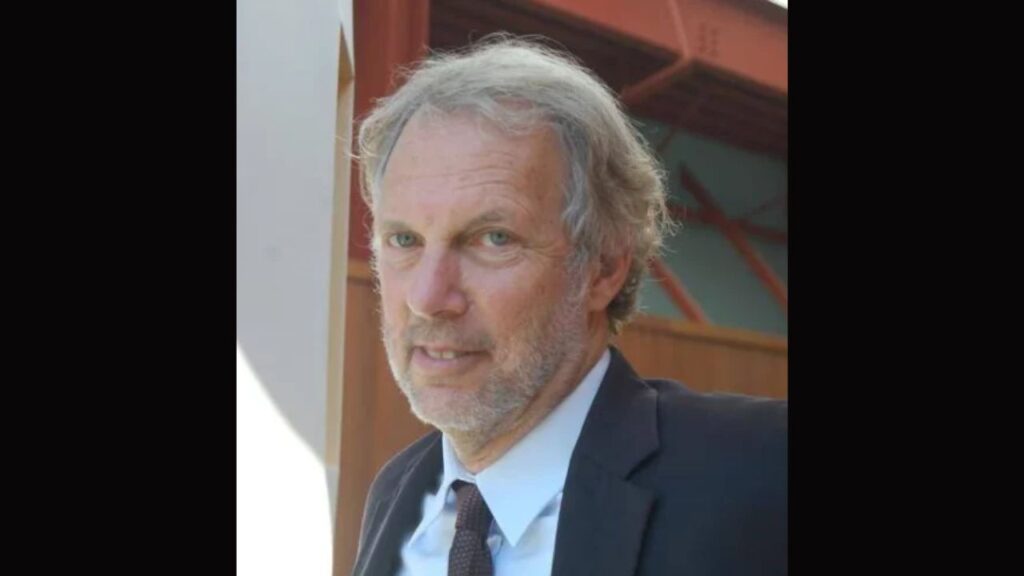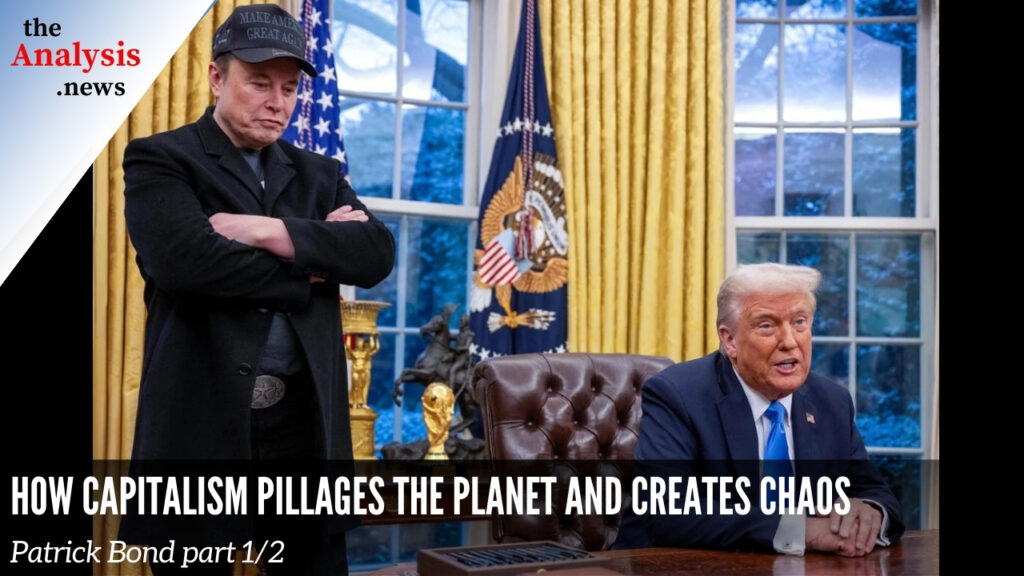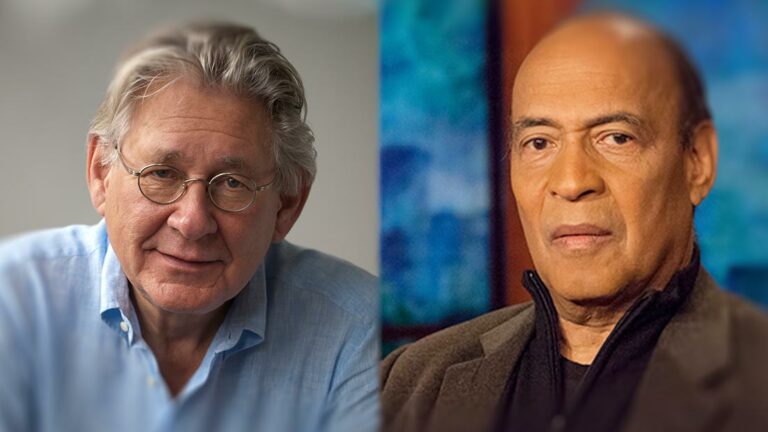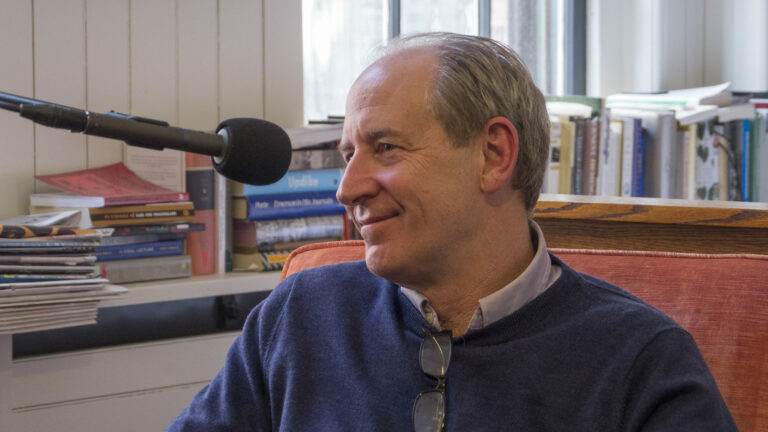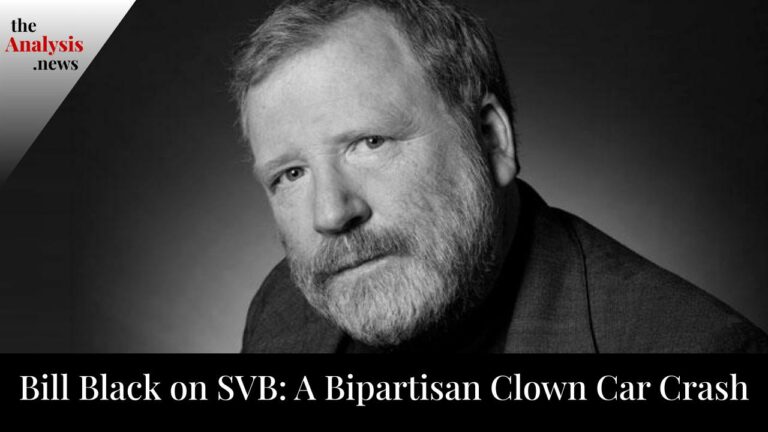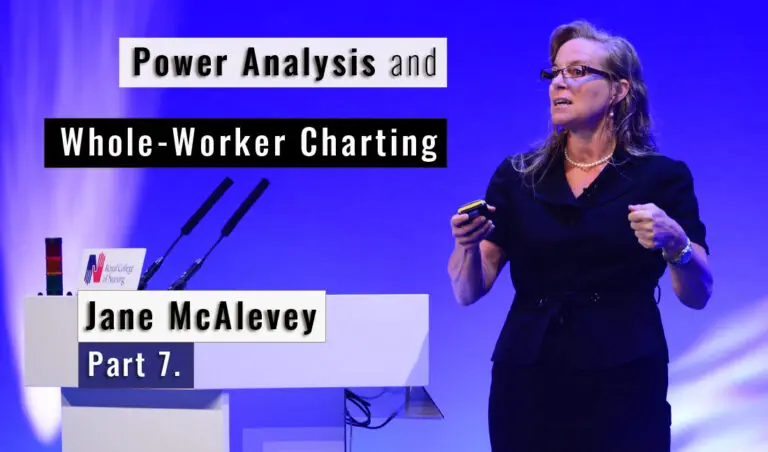In part 2, historian and geographer Jason W. Moore explains why climate and revolutionary struggles must understand capitalist dynamics and deploy a language of universal class solidarity to overthrow transnational power structures perpetuating the climate crisis.
Capitalocene: How Capitalism Created the Climate Crisis – Jason W. Moore pt 1/2
Talia Baroncelli
Hi, I’m Talia Baroncelli, and you’re watching theAnalysis.news. This is part two of my lively discussion with historian Jason W. Moore. If you’d like to support this content and the work that we do, you can go to our website, theAnalysis.news, and hit the donate button at the top right corner of the screen. Don’t forget to get onto our mailing list; that way, you’re always up to date every time there’s a new episode. Like and subscribe to the show on podcast streaming services such as Apple or Spotify, as well as on our YouTube channel, and please share the show if you enjoy this content. See you in a bit with Jason.
Joining me now is Jason W. Moore. He’s a historical geographer and professor of sociology at Binghamton University in Upstate, New York. He’s also the Coordinator of the World Ecology Research Network and is author of several books, including Anthropocene or Capitalocene? as well as A History of the World and Seven Cheap Things, which he co-wrote with Raj Patel. Jason, it’s a pleasure to have you.
Jason W. Moore
Well, it is a treat to be here today, Talia. Thank you for having me.
Talia Baroncelli
I’m sure there are some people listening who are thinking, so what? What does this all mean? Why is any of this relevant to have different perspectives or to not focus on this man-made binary with nature? I think if you want to put this analysis into practice, then you have to look at how relevant this could be for the climate struggle.
What would you say to that for revolutionary struggles or for climate movements such as, well, there are several, I’m thinking even Debt-for-Nature or movements which argue for the cancelation of debt, for example, or for other climate groups as well. How important is this adaptation of the language and the perspective that you’re deploying? How important is that for their struggles to be even more effective, or is it more of a linguistic issue?
Jason W. Moore
Yeah, well, of course, it’s not. It isn’t linguistic because language is a crucial nexus of power. I always love it when Marxists who should be committed to the critique of ideology are like, “Oh, that’s just changing the words around.” It’s clearly not. The analysis of the weak links of capitalism that proceeds from man versus nature leads to forms of neo-Malthusian techno-scientific authoritarianism. This is profoundly and thoroughly anti-democratic.
From the origins of second-wave environmentalism, I think of the first Earth Day in 1970, the first UN Conference on the Human Environment in 1972. From there onwards, the main ideological message has been listen to the science. Trust us. Give power to the experts. This is fundamentally anti-democratic.
Here, I agree entirely with Naomi Klein about the climate crisis, who basically says, echoing ’60s radicals, “The issue is not the issue.” The issue of the climate crisis is an issue of democracy. It is a crisis of democracy. Therefore, the first step has to be the assertion of popular power over the political structures of the world and to confront the oligarchies, the national security states, and the imperial apparatus in the case of the United States and a few other countries that are fundamentally about the dictatorship of capital.
We should stop pussy-footing around the issue with the illusion that somehow, if only we elect enough social Democrats to parliament, they will legislate socialism, and the climate crisis will go away. That’s not how it’s going to work.
The history of the 20th century, which eco-socialists routinely ignore, is a history of counter-insurgency and regime change politics. It’s baffling to me that folks want to devolve into single-issue politics. Single-issue politics really emerged out of the crisis of Fordism in the 1960s. It was an invention of the new right and then was picked up by elements of a centrist, liberal, professional managerial class strategy. Environmentalism was one of the major ones, not just in the U.S. but in Western Europe.
The result is something like, well, you’re in Berlin now, if I remember right, something like what you see with the German Greens. The German Greens love war. They love war. Look at the civilizational rhetoric coming out of the Greens and the warmongers in Germany right now, which is in the midst of the greatest rearmament since 1936. What could go wrong? Then, we begin to hear that old language of the Civilizing Project. The Russians might look like us, but they’re not us. They don’t value life. Josep Borrell, the E.U.’s Chief Diplomat, is saying, “Well, Europe is the garden, and the rest of the world is the jungle.” Yeah, exactly. This is exactly…
We talk about language. Ideological power flows through language and flows through the power to name. Most so-called radicals around the climate are not saying the problem is capitalism and not just capitalism as some system of corporate power. Yes, corporations, but also the increasingly tight nexus of the bourgeoisie and its political representatives, which is spectacularly advanced or degenerated, as the case may be in the United States, but clear in the U.K. and many other places. The left has been completely destroyed. The proletarian forces have been defeated across the Global North. In the Global South, you see the semi-proletariat organizing, but in very ideologically confused ways.
What’s necessary is clarity, a historical clarity, over the actual dynamics of capitalism in the web of life. And that means that we need a new conceptual apparatus that does involve a different linguistic turn. Let me point out that you understand this, Talia, but some of these idiots in the eco-socialist crowd say, “Well, it’s just language.” Every liberation movement in the modern world ever has insisted on a new language. Why? Because the language of the dominating and exploiting classes is one designed to keep people down. And that’s only intensified in the era of social media and misinformation fetishes and all of that.
Talia Baroncelli
Right. And all knowledge production is a representation of those power relations and inequalities that these movements are also trying to undermine.
Jason W. Moore
Absolutely.
Talia Baroncelli
The language is important. But you bring me to my next question then, and I think [Antonio] Gramsci, the Italian thinker and writer, would be really important to bring in at this particular moment. I think it was in 1919, after the April strike, and after he was maybe a bit pessimistic over how the workers’ councils were failing in a way. He wrote more about hegemony and how the issue is perhaps within the mindset of the proletariat or the working classes themselves because the hegemonic values of the bourgeoisie have been inculcated into the mass consciousness of the proletariat. There needs to be a shift in their way of thinking and way of viewing the world.
It sounds to me like you would still view that argument as being extremely pertinent right now, that there still has to be an ideological shift in order for these various climate movements that are so multifaceted, multiracial, and multinational to rise up and form a counter-hegemonic force.
Jason W. Moore
Now, right now, they can’t because they have fetishized nation, they have fetishized race, they have fetishized colonialism. They have fetishized, and therefore, all of these and more. To first lay out all the differences between, if you will, the workers of the world or the world’s semi-proletarians, we have to confront that head-on.
We have to understand that what people are embracing under the sign of decolonize everything and intersectionality is, in fact, a subaltern, if you will, expression of the bourgeois strategy to divide and conquer.
Talia Baroncelli
To break up solidarity, essentially.
Jason W. Moore
Exactly. You want to say, okay, if you’re white, you go over here. If you’re Black, you go over here. If you’re a woman here, a man here, straight here, queer here. All of this is embedded in, say, some of these absurd ideas that circulate within the academy, for instance, of the privilege walk, and of progressive stacking. It is designed to set workers against each other because, of course, there are more of us than there are of them, them being not European white men but the 1%: the owners of capital and the owners and possessors of the means of violence and destruction.
That’s a fairly simple notion, but I would say you invoke Gramsci, and I especially love the historicization of this in 1919 by Gramsci and [Vladimir] Lenin. Let’s remember that Gramsci was a Communist, a class struggle Communist, and a Leninist. What happened in the 1980s and ’90s is all of these professors discovered Gramsci and others that they could turn into professional managerial class toys or puppets, like hand puppets. They could cosplay being revolutionary without having to deal with the excruciating political conjuncture of that moment in 1919, when Lenin, Gramsci, and many others understood the proletarian revolution had been beaten back and defeated in Germany and many other places. Of course, the consequence of that was the rise of [Benito] Mussolini and [Adolf] Hitler.
Talia Baroncelli
Lenin was in prison for many years.
Jason W. Moore
Yes. Of course, Gramsci was put into prison, which is a good reminder: look, if you’re going to organize to take away the wealth and power of the 1%, be ready because they’re not playing around. They’re going to put you in jail. They’re going to kill you. They’re going to send the death squads and the drones. They’re going to dump Agent Orange on you. They’re going to do whatever they need to do to prevent your movement from gaining wealth and from redistributing what is, in the bourgeoisie’s view, their wealth and power. Of course, we understand the sources of all wealth are humans and the rest of nature, as Marx reminds us.
But in 1919, as Gramsci and Lenin were dealing with this problem, Lenin began a famous turn towards national liberation movements. He begins to understand, and this comes together in the famous Baku conference of 1921, that the Archimedean lever of the world-class struggle was in the third world, in the colonial world at the time, in the Global South. This was the Archimedean lever of worldwide class struggle. It wasn’t some simplistic, naive, social democratic workerism. Remember, the Socialists all voted for war in 1914.
We want to understand that history as we look at the present moment and begin to identify a working class as an agent of history that is not the old Eurocentric, economistic, formalist working class. It is what I have argued for: a planetary proletariat, a proletariat, biotariat, and femetariat, unifying paid labor with unpaid work of women, nature, and colonies. Not as a typology, but we are all biotarians now. We are all femetarians. We are all enmeshed in this web of cooperation and proletarian solidarity, at least potentially, but we’ll have to rebuild because the neoliberal ruling classes have really defeated the working classes and also convinced many leftists that they shouldn’t want state power. I see this all the time in the North American Academy. North academics love Indigenous peoples as long as they don’t take power.
Talia Baroncelli
Yeah, just do land acknowledgments, and it is fine.
Jason W. Moore
Yeah, let’s do that, or we could say land acknowledgment and decolonize this. When Evo Morales takes power, they’re like, “Oh, no, we can’t have that.” And what they say is, look, first of all, building socialism is not that easy. And second of all, there’s one group in the world that knows socialism works and that’s the bourgeoisie. They know that socialism works, so they sabotage it, and they impose sanctions. At the heart of it, this goes back to Lenin and Gramsci’s point, at the heart of it, from the standpoint of empire, they don’t care about communism or not. They don’t care what you call your state. What they fear is an independent third world or an independent Global South. That’s why the Americans hated the Soviets. It wasn’t about communism. It was that the Soviets sat on all of that wealth, power, oil, and everything else, and they couldn’t be overthrown until the end of the ’80s when they were overthrown.
Talia Baroncelli
When you speak about the 1% and corporate elite, and if you’re looking at climate movements and young people who are so fed up with power and resources being consolidated in a very specific, narrow corporate class that supports big oil and gas and is also supported by big oil and gas because of all the lobbies, how do you unseat that consolidation of power? Because you could have all the climate movements in the world, but if you have this corporate class that has adopted this form of green capitalism as well as this neoliberal green capitalism of, yeah, we’ll invest in carbon capture and storage and enhance oil recovery to make it look like big oil and gas is cutting emissions and are on the side of the young people. They’re shifting. They have their ecological solutions that aren’t really solutions. I guess there are probably two aspects of that. The language is incredibly important, as you mentioned, but how do we actually unseat those centers of power?
Jason W. Moore
Well, first, we have to have clarity of analysis. What’s often called green capitalism, and your summary is excellent, is, in fact, a post-capitalist strategy for a civilization based on political accumulation. That is one in which there are many of the accoutrements we would associate with capitalism, but it’s fundamentally governed by a political dynamic. I call this the ‘too big to fail dynamic’ out of the phrase that came to fame in the Great Recession, where the big financial institutions were, “Too Big to Fail.” Obama comes in, he bails out the criminal banksters and puts six and a half million people out on the streets. That’s political accumulation. That’s not a very common occurrence in the history of capitalism, but increasingly so because the masters of mankind, to borrow Adam Smith’s phrase, understand that their grasp on wealth and power depends on politics, on controlling the states and controlling the military and repressive apparatus. Also, the surveillance apparatus, which, as we know, is quite advanced in the U.S. with the very, very tight relationships, really enmeshed, interpenetrating relationships between Silicon Valley capital and the national security state. This has all come out with the Twitter Files and many other reports in recent years.
Talia Baroncelli
With police as well, it seems like the police have some money and funds where they can buy all sorts of surveillance tech.
Jason W. Moore
That’s exactly right. We’ve witnessed not only the massive growth of a surveillance economy but also what David Gordon and Sam Bowles once called the garrison economy, the growth of the guards, the prisons, the police, and everything else.
There’s, I think, a lot of… confusion is the nicest way to put it when we come to these climate justice movements. By and large, they refuse to identify capitalism, and they talk about it as if it’s a system of corporate power. No, it’s a system of class power in which the reproduction of ruling class power depends on what? The control over the state. Yes, they have an ideological apparatus. Yes, there are hegemonic and counter-hegemonic struggles. But what happened in the 1980s and ’90s is that academics said, “Well, we’re going to talk about counter-hegemony.” Like that’s all about civil society, forgetting or closing their eyes to the reality.
Civil society was an invention of what was called, in 1968, the Cultural Cold War. This very, very intimate connection between what we now call the non-profit industrial sector and cultural counter-insurgency worldwide. This has given rise more recently to what we call Color Revolutions, where you have CIA cut-outs like the National Endowment for Democracy actively overthrowing, as in Ukraine in 2014, the democratically constituted government. There are many other examples we could provide. But there’s this sense of like, oh, we’re just going to resist, and then somehow the resistance is going to translate into pressure politics that will convince capitalists to give up their wealth and power. This is the Greta Thunberg strategy. And by the way, she’s not new. There’s an exact parallel from 1992, around Rio, with Severn Suzuki, the child of one of Canada’s greatest environmentalists, as I’m sure you know. This is very common. We’re going to talk, we’re going to use all this woke language, but we’re not going to name the centerpieces of the coherent and cohering mechanisms of capitalist class power.
Also, to understand, people are going to say that I’m wrong, but capitalism is dead. Capitalism is in its zombie phase. It’s still moving around. It’s still deadly. But the ways that it has for five centuries overcome its crises no longer exist. Those frontiers of cheap nature are no longer there, but also the frontiers of cheap waste are now gone. What does that mean? Here’s a great example: climate change has already suppressed agricultural productivity. Fully eight years of productivity loss have been recorded. So far, according to the OECD, the 24-member Country Member Club of Rich or Semi-rich Countries, agriculture will absorb half of all the costs of climate change. That’s fundamental because the whole apparatus of capitalism of expelling labor from the countryside rests on agricultural revolutions. Those days are over. Climate-smart agriculture is not going to rescue anything.
Once we begin to develop clarity, then the answer becomes an old-fashioned answer. It’s necessary for the popular forces to seize state power and maintain it at all costs. We know that violence ensues after that, but we also know the violence that ensues from failure. I think of the U.S. interventions, the death squad imperialism in El Salvador in the 1980s, the consequence of the failure or the defeat, rather, of the proletarian forces, the FMLN, in that struggle has led to this dystopian prison industrial hellscape that is El Salvador today. You think that the struggle is indeed worth it. It’s not going to come from just resisting. We saw this with Occupy. You have to have politics.
Talia Baroncelli
What if it’s essentially grassroots? To me, it sounds like you’re saying that these different Indigenous movements, for example, and I think there was something recently in Colombia, even, where they were taking back some of the land and having maybe different councils of how to manage that land. Would you say that that’s not revolutionary enough? Because you’re saying that people need to take [crosstalk 00:21:59]
Jason W. Moore
I would say those are defensive strategies. Defensive strategies, of course, are the order of the day, given still the worldwide political balance of class forces. That’s inevitable. We will have many defensive struggles. They are called resistance struggles. They should be defended. The problem is they don’t meet my criteria for revolutionary action. The criteria is, is this part of a strategy to actually take power and take power away from the bourgeoisie. We know the long and violent history of soft power, hard power, economic hitmen, death squads, and regime change, training the militaries to take power, engage in, and stay in terrorism like the U.S. with contras in Nicaragua. We know what’s coming. This is not going to be a surprise. The ruling class is not going to be somehow convinced.
You mentioned Columbia. Of course, Columbia has long been known as the most dictatorial so-called democracy in the Americas. Twice, FARC has laid down its arms, and twice, what happened? They came back and made them pay for it. I don’t think they’re laying down its arms again. This has to be done in terms of a Gramscian strategy. Gramsci was not like we don’t need to be ready to cede state power; we need to indeed identify, as Marx would say, the rich totality, the rich diversity of struggles, and look for their common threads, and then look for the weak links in the imperialist chains of power. Because, of course, taking state power is not enough.
Look at Venezuela, subject to basically constant sanctions and regime change politics, soft power, color revolution, and mercenaries, undoubtedly financed through the CIA Black Budget coming in. This is the dynamic of our times. I worry that a lot of these resistance struggles… the indigenous peoples in Colombia, they know what this is like. I’m not saying they don’t know what the front lines are, but if you look at what the politics are of social democratic academics and other professionals in the Global North, there is a complete memory holding of all of this history.
Talia Baroncelli
Right.
Jason W. Moore
Including in the United States. It’s absurd in the United States where, I mean, for Christ’s sake, the National Security State killed or had Martin Luther King killed.
Talia Baroncelli
Yeah, of course.
Jason W. Moore
This is not a conspiracy theory. This is like out in a day; this has been reported for three decades, actually, going back to the ’70s. We need to be engaged in defensive struggles. They need to be linked to serious multiracial, anti-imperialist, feminist working-class politics. Otherwise, you end up with a rolling series of resistance movements. You have Occupy here. You have the No D’appel over there. You have all of these isolated struggles that don’t ever congeal into actual politics, or they subordinate themselves to social democratic politics. You know this, as you mentioned, growing up in Toronto. You know this from the New Democratic Party. The New Democratic Party never misses an opportunity to move to the right. This is the case for Social Democrats across the world for the past, well, for the past forever.
Talia Baroncelli
Yeah, that’s also taking place right now in Germany, where the AfD has come to power in certain parts of the country. The Social Democrats started instituting more right-wing policies to try to take back those voters who then went over to the AfD. But it doesn’t work that way. That’s not how you’re going to get people back. You increase your electorate, if you actually have the right left policies that will enable workers to have some better standard of living, rights, and to redistribute resources, and not just, oh, we’re going to have anti-migrant policies.
Jason W. Moore
The liberal diagnosis of the problem is white supremacy.
Talia Baroncelli
Right.
Jason W. Moore
That is, for one thing, wrong. Yes, white supremacy is a result of the process, but this is part of the general realignment of social democratic parties, as people like Elizabeth Humphreys have detailed around the neoliberal agenda. Of course, this should not surprise us that Social Democrats, almost without exception, and there are one or two exceptions, move to the right. They cooperate with the deep state. Social Democrats hate the left. They hate the left more than they hate the right. What they want to do is either move right, like you’re saying with the AfD, and this is all across Europe; as you know, the rise of the populist right is channeling working-class outrage at the social democratic and centrist liberal Christian democratic model.
Working class people should be outraged. It’s a failure of the left. It’s a failure of the academic cultures which embraced anything but class leftism, ABC leftism, and refused to keep their hands on the tiller and steer towards the North Star around working class revolution and the expansion of democracy and of working class power. Socialism is not more power for the professional-managerial class. Socialism is more power for the working class.
Talia Baroncelli
Right. Having this totalizing view of everything as just being a product of white supremacy, in a way, reinforces those racialized structures and white supremacy because it doesn’t present a threat to the classes that control the modes of production and that are the consolidated bourgeois or rich elite.
Jason W. Moore
Yes.
Talia Baroncelli
If you just focus on that aspect, which is a result and maybe not the driving factor, then you don’t get any real shift in the material conditions or in redistribution of power, any universal working class struggle, which would actually in turn, contribute to the livelihoods of racialized and marginalized people. The outcome of that lens or of that way of understanding the world, in a way, it just reinforces it. It doesn’t lead to any change.
Jason W. Moore
It absolutely reinforces it. We see this around the critique of settler colonialism. What’s the politics of settler colonialism? It’s supposedly ethnic cleansing. The inverse of it is inverted ethnic cleansing. That’s not what we need. We don’t need more nations. We need the proletariat to run the affairs of the planet and to proceed to abolish class distinctions.
Around this question of race and racial capitalism, much of the current vogue is a rejection of the Communist parties; I think in the U.S., the Communist Party USA’s position on multiracial working-class unity, pioneered by people like W. E. B. Du Bois, Claudia Jones, and many others in this period. I’ve written a little bit about this. I urge people to go back and consider the multiracial, anti-imperialist, feminist proletarian strategy, all of which sounds very old-fashioned. It sounds old-fashioned because the neoliberal ideological offensive has memory-holed and destroyed our capacity to remember these traditions. It’s deracinated us, uprooted us from traditions of communists and socialist struggle. Whether we agree with those traditions or not, or we want to advance them, renew them, or be creative around them, we need to remember what they were in order to do that, not simply reinvent woke wheels.
Talia Baroncelli
Right. Just one final thing. I don’t know if we’ll have much time to get into this, but if you look at the legal apparatus that’s in place after the First World War and the Second World War, you have the right to self-determination. It’s all this rights framework that is based around the nation state. That in itself is not going to cut it because if you look at, for example, the right to self-determination of Palestinians, I don’t see how having a two-state solution, for example, is all of a sudden going to address all of the issues because ultimately there is a class factor.
As you were talking about the various capitalist ways of cheapening nature and cheapening humans and pulling people into this system which cheapens them, that’s not going to be addressed if you have rights that align with the interests of nation-states and the interests of nation-states also serve the interests of the neoliberal class. I guess we need to get somewhere, and there has to be some sovereignty for the Palestinians, for example. But seeing it as an issue of statehood is, in my view, poorly wrong.
Jason W. Moore
Well, and there’s a profound naiveté around national self-determination. As the Russians discovered in 1917, simply hoisting the red flag or whatever flag of color you choose does not make you independent. The imperialist countries do not want independence. This was what America had to wrestle with as the world’s hegemonic power after World War II: how to control and dominate a world without a formal colonial structure. They were wrestling with this all the way through. Basically, you could go along with the Americans, or you would be subjected to, well, say, the experience of Vietnam. That’s something that I think has not been properly digested. There is this long history of what it takes to win self-determination, never mind building socialism.
Many of these radlib academics go out and say, “Well, socialism failed. It didn’t do this. It didn’t do that.” It’s like, well, according to whom? I mean, according to those who benefited from the defeat of Nazism, maybe socialism succeeded. Maybe that was what socialism in the 20th century was about. Maybe it was about opening space for third-world movements. Do we think for a minute that Libya went from the most secular and prosperous country in Africa to a country where there are open slave markets on the streets of Bengasi? Do we think that Libya, for a moment, would have been destabilized if the Soviet Union was still around? There’s that naivete that comes from memory-holing history. I called this in one recent essay, The Flight From History. This is what pretty much defines most of this radlib, radical posturing, decolonial set of arguments in the world, and it crucially undermines our capacity to forge the worldwide proletarian solidarity necessary to begin to push at the imperial structures that hold the climate, the capitalogenic climate machine together.
I’ve said this many times. If we want to do something concrete, let’s demand that all of the European armies withdraw from the rest of the world, the American armies. Get the French out of Africa. Get the U.S. out of Africa. Shut down the bases, 700 plus bases, and three new bases in the Philippines to face off against the Chinese now. These are the real coercive instruments of political power. They’re not going to go away because people occupy a town square. Now, occupying a town square may be necessary as part of the struggle. Don’t get me wrong, but it’s not like Congress is going to convene and say, “Let’s shut down the bases.”
Talia Baroncelli
Well, I think next time we talk, it would be good to do an episode on the various strategies and also real existing socialism. The different experiences of the Soviet Union, for example, and whether this Vanguard strategy that’s driven by a specific party is the way to go or if there could have been correctors to that. That’s a whole other debate, which we could get into next time, and there’s a lot of scholarship on that.
Jason W. Moore, it’s been really great to speak to you.
Jason W. Moore
Absolutely.
Talia Baroncelli
Thanks so much for your time. Let’s talk again soon.
Jason W. Moore
Talia, it has been a pleasure. Thank you for such a lively conversation. For those who are interested in anything that I’ve just said, you can go to my website, jasonwmoore.com.
Talia Baroncelli
Thank you for watching theAnalysis.news. If you’d like to support us, you can go to our website, theAnalysis.news. Hit the donate button at the top right corner of the screen and get on to our mailing list. See you next time.
Podcast: Play in new window | Download | Embed
Subscribe Apple Podcasts | Spotify | Android | iHeartRadio | Blubrry | TuneIn | Deezer | RSS
Never miss another story
Subscribe to theAnalysis.news – Newsletter
Jason W. Moore is an environmental historian and historical geographer at Binghamton University, where he is a professor of sociology and leads the World-Ecology Research Collective. He is the author or editor, most recently, of Capitalism in the Web of Life, Capitalocene or Anthropocene?, Nature, History, and the Crisis of Capitalism, and, with Raj Patel, A History of the World in Seven Cheap Things. His books and essays on environmental history, capitalism, and social theory have been widely recognized, including the Alice Hamilton Prize of the American Society for Environmental History (2003), the Distinguished Scholarship Award of the Section on the Political Economy of the World-System (American Sociological Association, 2002 for articles, and 2015 for Web of Life), and the Byres and Bernstein Prize in Agrarian Change (2011). He coordinates the World-Ecology Research Network.

